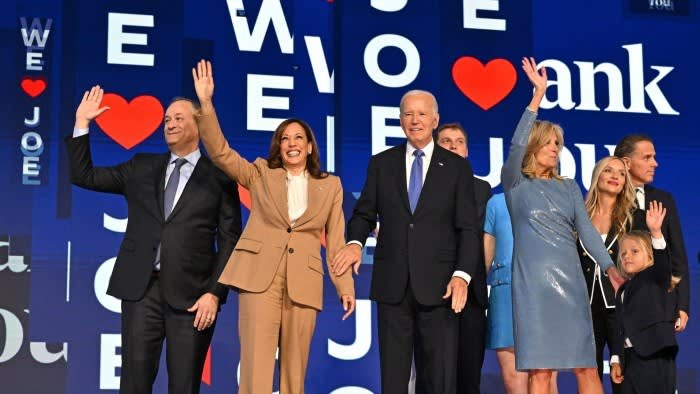This article is an on-site version of our FirstFT newsletter. Subscribers can sign up to our Asia, Europe/Africa or Americas edition to get the newsletter delivered every weekday morning. Explore all of our newsletters here
Good morning. Today we’re covering:
-
Iran’s attempts to sabotage the US presidential race
-
The US’s support for a UN-led treaty calling for reduced plastic production
-
Anticipated intervention by antitrust regulators in the 7-Eleven takeover attempt
But first, Kamala Harris’s plans for the US economy have come under fresh scrutiny by economists and business leaders, as this week’s Democratic National Convention sheds light on what an administration led by her would look like.
Proposals that have come under fire include her pledges to ratchet up the corporation tax rate from 21 to 28 per cent, impose a federal ban on price-gouging in the food sector and to offer more tax breaks for first-time homebuyers. Earlier this month, she also backed a plan to scrap taxes on tips — a policy lifted straight from Donald Trump’s agenda.
“This plan was obviously not designed to appeal to economists,” David Wessel, a senior fellow in economic studies at the Brookings Institution said. Others have called the plans populist and gimmicky, and worry about their market-distorting effects. However, some elements of the Harris plan, foremost boosting housing supply, have drawn praise, particularly as markets bet on interest rate cuts later in the year.
The common thread of the proposals is that each promises to address concerns expressed by the average voter, such as high inflation and the cost of raising children. And the doubts of policy analysts don’t appear to have damped the energy in Chicago, as thousands of rapturous fans anticipate former president Barack Obama’s speech today.
-
Opinion: The US economy is set for volatility, whoever wins the White House, the FT’s economics commentator Chris Giles writes.
-
FT poll of polls: Track the polls in every state and the possible paths to electoral victory for both candidates here.
Here’s what else I’m keeping tabs on today:
Thanks for reading FirstFT. Do you have burning questions about the news, or anything you want to ask an FT reporter? Email firstft@ft.com or hit ‘Reply’ with your questions, and remember to include your name and where you’re writing from. We’ll answer as many as possible in a special weekend edition of the newsletter.
Five more top stories
1. Antony Blinken, US secretary of state, reported progress towards a Gaza ceasefire-for-hostages deal yesterday, saying that Israeli Prime Minister Benjamin Netanyahu had accepted a “bridging proposal” aimed at resolving differences between Israel and Hamas.
2. US antitrust regulators are likely to challenge any proposal by Canadian retailer Alimentation Couche-Tard to combine with the Japanese operator of 7-Eleven over concerns a deal would increase prices for consumers and damage the labour market, according to people familiar with the matter.
3. Intelligence officials have said that Iran was behind the recent hacking of Donald Trump’s presidential campaign, illustrating Tehran’s “increasingly aggressive” attempts to interfere in the US election.
4. The US will support a UN-led global treaty calling for a reduction in how much plastic is produced each year, signalling a policy shift in the wake of rising evidence of the harmful effects of the material on human health.
5. Investors who cut their equity exposure during the turmoil in markets earlier this month have sharply increased their holdings as global stocks rebounded last week, Deutsche Bank flow data shows.
News in-depth

Walmart, the world’s biggest retailer, posted rising profits last week on the back of sales of the sort of items you might expect: clothes, groceries and toys. But its profits rose faster thanks in part to one item that might not be in your shopping basket: advertising. The supermarket giant’s ad business, Walmart Connect, is helping vendors use rich data profiles on customers’ consumption habits to better target them. And this higher-margin business is exciting investors.
We’re also reading . . .
-
Mobile phone policy: The idea of banning mobile phones from school classrooms has achieved the politically impossible — persuading many US Republicans and Democrats to agree on something, writes Patti Waldmeir.
-
Tech bullies: Political leaders must push back against aggression by powerful executives, whether through a childish meme or via apparently respectful communication, writes Marietje Schaake.
Chart of the day
This year, corporate leaders have publicly ducked questions about the fraught US presidential race. Many of them have also been privately torn. This is a marked shift in attitudes among chief executives before Trump’s victory in 2016, when the Republicans were the party of choice for an overwhelming majority of business leaders.

Take a break from the news
Grace Cook’s grandma Mary often jokes that she’d forget her head if it wasn’t “screwed on”. But poor memory is not just an affliction associated with older folks. Research suggests that young people, inundated with notifications and a culture of multitasking, are also suffering from impaired cognition and brain fatigue. Here’s how you can boost your memory.

Additional contributions from Camille De Guzmán and Benjamin Wilhelm





